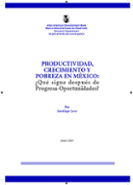Productivity, Growth and Poverty in Mexico: What Follows Progress-Opportunities?
Date
Jun 2007
Conditional cash transfer programs are based on a simple, yet powerful premise: creating adequate incentives today to stimulate the accumulation of human capital in poor families can provide future generations with the opportunity to generate their own higher incomes. Looking at the experience of Progresa-Oportunidades--the oldest such program whose results after 10 years provide valuable lessons--offers the opportunity to examine whether the youth of Progresa-Oportunidades, in a not too distant future, will be able to find productive jobs that allow them to escape the poverty that has trapped their parents. In this study, Santiago Levy looks at this question from an innovative perspective, analyzing how the intrinsic structure of incentives created by a set of social policies can aid or inhibit the achievement of the principal objective of Progresa-Oportunidades: to break the intergenerational transmission of poverty. This study can help spark a discussion in many countries on the links between social policy, productivity growth and, in turn, poverty reduction.



